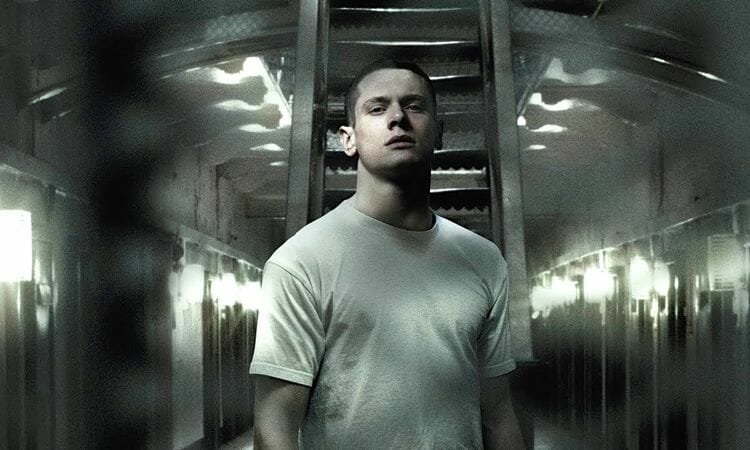By Jim Rohner · August 31, 2014


When I was a kid, I was in no rush to be an adult. Childhood meant fun, whereas adulthood meant serious. Being a kid meant being carefree, whereas being an adult meant taking on responsibility. Born and raised in a white, middle-class suburb, I was afforded the luxury to delay my ascent into adulthood for as long as I possibly could, believing, perhaps deludingly so, that my transformation into what the world would dub to be "a man" would come when I was ready to leave childish things behind me and embrace the responsibilities and implications accompanying manhood.
Brought up in this environment, I was also unaware that not everyone is afforded the same luxuries.
Eric Love (Jack O'Connell) was likely not afforded the same luxuries. Our introduction to Eric is as he's going through processing upon entry into a maximum security prison. This prison is reserved for convicts dubbed by society to be high risks, ultra-violent and, according to Deputy Governor Hayes (Sam Spruell), beyond all hope. Eric is being "starred up," that is to say, being transferred to this adult prison despite being, as many around him routinely declare, "only a kid." Age-wise, he may not be an adult, but he's got the rap sheet and the violent temper to equal, if not best, any of his wingmates. Think Bronson but without the dark humor.
Eric's arrival and temperament arouses the interest of many regular faces around the prison, especially Oliver Baumer (Rupert Friend), a volunteer and "non-operational" staff member who holds regular therapy sessions with many of the worst inmates, and Neville Love (Ben Mendelsohn), Eric's estranged father and career criminal. Both men will try to build up Eric's trust, but for different reasons. Oliver wants to help Eric, believing that no one is ever beyond hope. Neville wants to control Eric, knowing that the more his son acts up, the more the "kangas" (correctional officers) crack down on the wing. That's just bad for business.
Any exceptional film set in a prison will explore the idea that prison is a firmly-entrenched system, a system that, perhaps even more so than those that exist outside of the thick concrete walls and barbed wire fences, will carry on inflexibly in perpetuity. Starred Up is an exceptional film set in a prison and does well exploring that system. It takes particular care in commenting on how prison is broken, how it's been broken, and how it will infinitely hobble along broken. There doesn't seem to be a debate anymore as to the validity of the term "correctional facility," with the settled argument taking the form of officers acting merely as well-armed firefighters and the inmates as merely white hot fires in Starred Up.
Eric enters the prison almost resigned to the fact that as a prisoner, it's his role to be hateful and violent and the correctional authorities, from Deputy Governor Hayes on down to the riot police, are resigned to answering violence with violence. Hayes, skillfully depicted by Spruell with minimal screentime and dialogue, seems to actually take joy in the retaliation. It's despicable, but he's just as much a victim of the system in which he's a part as Eric. Eric may be the one against whom the odds are stacked, but it's not Hayes who stacked them; he's just playing the (admittedly overwhelmingly beneficial) hand he was dealt. Eric also doesn't tend to do himself any favors.
Starred Up is almost unbearably tense. Violence could ignite at any moment with just the slightest provocation. Many of the inmates, Eric included, are so quick to defend their skewed sense of pride that a simple look could incite a conflict. So fully realized is the environment and the characters who inhabit it that we as the audience are constantly and uneasily aware of the shadow they cast, worried that even the therapy sessions could result in blood spilled and tenuous relationships severed. Our guide through this nightmare is Jack O'Connell, who fantastically handles a character that, if approached with any less skill and understanding, would fall apart as a protagonist completely. If O'Connell is any gentler with the character, then his softness paints him as a lead unworthy of the world he inhabits, whereas portraying him any harder would paint him as a sociopath unworthy of our attention. As he is portrayed throughout Starred Up, however, Eric is the most unique of leading men – a monster who nevertheless deserves our empathy.
Why we're able to empathize with Eric is due to the universal question raised amongst an otherwise specific story: can people change? Eric is a prisoner, but prison is not the only system that exists to oppress in Starred Up. Family, as embodied in Neville Love, is also a system in place, one that has shaped Eric his entire life and is unquestionably the one most responsible for his violent nature in the first place. Oliver firmly believes that he can reach Eric and yet the omnipresence of Neville, a leader figure in the prison who also happens to be the worst influence on Eric, means that regression is always a very real danger for a violent man who is still, let's not forget, "only a kid." This tension between the man Eric is and has been and the man he could be is what thrusts the narrative forward, sometimes violently, sometimes uncomfortably, but always engagingly so, even when Oliver is not seen. It is perhaps an audacious idea to believe that the systems can be changed, but director David Mackenzie and writer Jonathan Asser believe and make us believe not only that the victims of the system can be changed, but that it is also right and worthwhile attempting to do so.